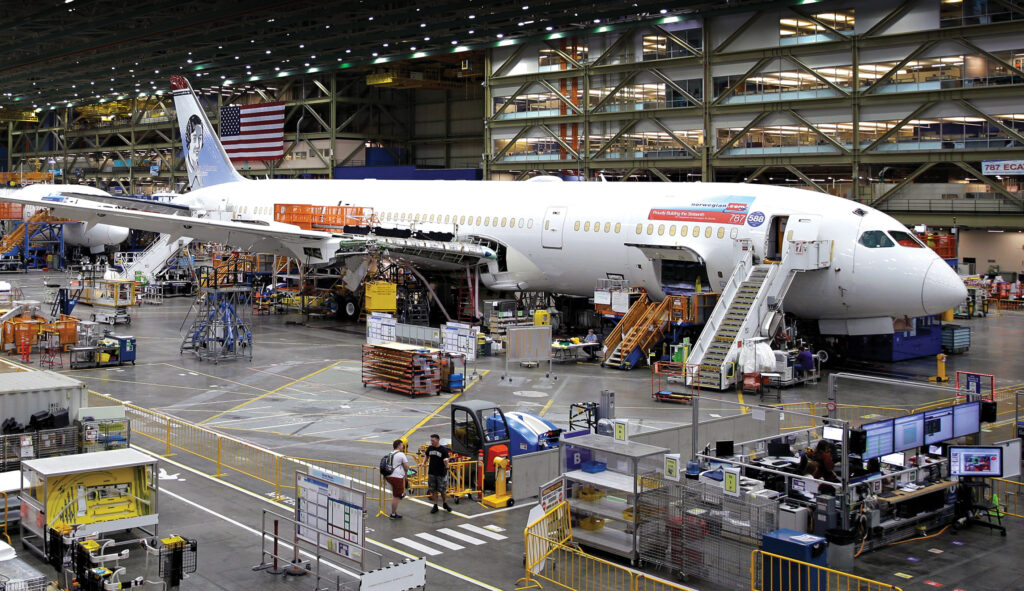
Aerospace manufacturing giant Boeing’s stock has regained some altitude after the COVID-19 travel industry plummet, but it continues to face significant market turbulence. Regulators from multiple countries and agencies are subjecting the company to unusually close scrutiny, for good reason.
This year alone, one Boeing 737 Max had to make an emergency landing after a “plug door” came off at 16,000 feet. Terrified passengers flying out of Portland, Oregon, on Alaska Airlines flight 1282 got to know the meaning of “explosive decompression” up close.
Since that Jan. 5 incident, many other Boeing planes have been plagued by technical problems, emergency landings, missing panels, and malfunctioning parts. A 787 Dreamliner on the way to New Zealand took an unexpected nosedive in mid-March. There was no crash, but 50 passengers reported injuries. Earlier that month, a 737 Max skidded off the runway in Houston.

To make matters worse, John Barnett, a retired Boeing quality control engineer-turned-whistleblower, was found dead in South Carolina. The cause was an apparent self-inflicted gunshot to the head.
Barnett had charged Boeing with gross neglect on a number of fronts, including the installation of emergency oxygen systems with high failure rates. Whether or not that ultimately proves true, his death puts an exclamation point on Boeing criticism in general. The anti-Boeing story is that the company simply doesn’t care if it puts out shoddy products.
Boeing’s progress
Boeing President and CEO Dave Calhoun is trying to counter that narrative. In a message that accompanied the company’s reported quarterly earnings for the previous year at the end of January, Calhoun demurred from addressing the financials.
“While we often use this time of year to share or update our financial and operational objectives, now is not the time for that,” the Boeing president said in a statement. “We will simply focus on every next airplane while doing everything possible to support our customers, follow the lead of our regulator, and ensure the highest standard of safety and quality in all that we do. Ultimately, that is what will drive our performance.”
To that end, Boeing has hired retired Navy Adm. Kirkland Donald as a special adviser to Calhoun whose job it is to “conduct a thorough assessment of Boeing’s quality management system for commercial airplanes, including quality programs and practices.” In the short term, the company has announced it is conducting regular quality checks to increase the quality of its product.
Many market analysts are of the opinion that Boeing will be able to right itself based on past results. Boeing’s debt spiked in 2020 from $19.9 billion to $61.8 billion, but the company has successfully whittled away at that every year since, bringing the current debt load down to $47.1 billion.
Boeing stock closed on March 20 at $187.78 a share. That was down year-over-year but only by 8.27% and was nowhere close to the bottom that the stock found on March 20, 2020, at $95.01 a share.
Still, Wall Street is not all sunshine and rainbows when sizing up the hurdles Boeing will have to clear. The ratings service Fitch changed its outlook on Boeing from “positive” to “stable” in March based on the expectation that regulatory compliance will slow down Boeing’s delivery of new jets to airlines.
Can Calhoun deliver?
Several experts in the aerospace and transportation space were consulted to size up Boeing’s current prospects. The Washington Examiner asked: How much trouble is Boeing in? What can the company do to help right itself? Will European competitor Airbus be able to capitalize on Boeing’s regulatory and safety stumbles?
“Boeing’s trouble is around production quality, the ability to actually deliver planes and certify new types, and attractiveness to customers (which affects price, and therefore whether it can sell planes at a profit),” Gary Leff, author of the influential View from the Wing website, told the Washington Examiner in an email. “It is not just one problem but many, and that makes the trouble significant.”
“Airlines are still willing to place orders for [Boeing’s] planes (American Airlines, for instance, announced an order earlier this month), but whether or not those deliver on anything like the promised timeline and the prices they need to offer to attract those orders remain an open question,” he added.
Leff granted that “Airbus is more attractive to many airlines right now” but was skeptical that Boeing’s chief competitor could step up.
“[Airbus] simply do[es] not have enough planes in the pipeline to pick up slack for Boeing,” he said. “They can demand higher prices and, over time, expand capacity, but that cannot fully displace Boeing’s production.”
William J. McGee, a senior fellow for aviation and travel at the American Economic Liberties Project, was more bullish on Airbus’s ability to deliver for airlines.
“Airbus already has been capitalizing on Boeing’s woes,” McGee told the Washington Examiner. “Traditionally, Airbus was No. 2 behind Boeing, but in recent years and especially in recent months, Airbus has been outselling Boeing’s airline orders globally.”
He suggested, “The question is whether this is temporary or a much more permanent trendline. The longer Boeing proves itself incapable of running a safe and efficient operation, the stronger Airbus will continue to grow. This is not lost upon the world’s airlines since some of them clearly are losing faith in Boeing.”
McGee is deeply skeptical that Boeing’s current leadership has what it takes to right the company, going so far as to say that Boeing’s “CEO and the entire board should resign.” He believes the company “lost its way” with a merger with fellow aerospace company McDonnell Douglas in the 1990s by swapping an engineer-driven leadership for MBAs.
“The problem is that the lengthy and costly process of designing, building, and flying large commercial and military aircraft is not conducive to short-term earnings,” he said. “Boeing executives used to understand this, but in recent years, they have compromised quality and even safety by outsourcing critical work, cutting corners, ignoring internal whistleblowers, and covering up crisis after crisis.”
McGee foresees serious difficulties with the Federal Aviation Administration’s efforts to regulate Boeing.
“Simply put, the FAA will need to babysit Boeing’s operation in a way that it has never babysat any aviation company before,” he said. He went so far as to argue, “If a viable reorganization plan is not produced in conjunction with the current FAA, NTSB, and DOJ investigations, then nationalizing Boeing should remain an option.”
Marc Scribner, transportation policy analyst for the Reason Foundation, suggested maybe the way the FAA’s regulations are currently designed is at least one part of the problem.
“There seems to be growing agreement that Boeing’s safety management system (SMS) has not produced the intended results, but also that this may be part of a broader problem with the FAA’s approach to SMS implementation,” he said. “This calls into question the remedies some have proposed, such as SMS mandates, because the proposed remedies may also be defective.”
As for who benefits from this mess in the short term, Scribner said, “Boeing’s problems certainly benefit Airbus, the only other jumbo jet manufacturer, but constrained production capacity and the current aircraft order backlog don’t allow room for much maneuvering.”
Beyond Boeing and Airbus
But what about the long term? The final question the Washington Examiner put to experts was: Are there any competitors other than Airbus that could step up at this point? Their answers gave a glimpse of the possible far-flung future of commercial aviation.
“At this point, there aren’t any other competitors who can step into Boeing’s shoes,” Leff said. “China’s commercial aircraft program is young, and Russia’s isn’t as attractive even apart from sanctions faced. Bombardier and Embraer can manufacture regional jets but don’t have comparable aircraft, and the timeline to design and certify a new plane is yearslong.”
CLICK HERE TO READ MORE FROM THE WASHINGTON EXAMINER
McGee agreed, after a fashion. “Boeing and Airbus maintain a global duopoly on large commercial aircraft,” he said, adding, “There are many smaller commercial aircraft manufacturers throughout the world. There also is a nascent commercial aerospace industry growing in China, as well as in Russia.”
He predicted, “Long term, any or all of these competitors could grow stronger if Boeing continues to falter.”






